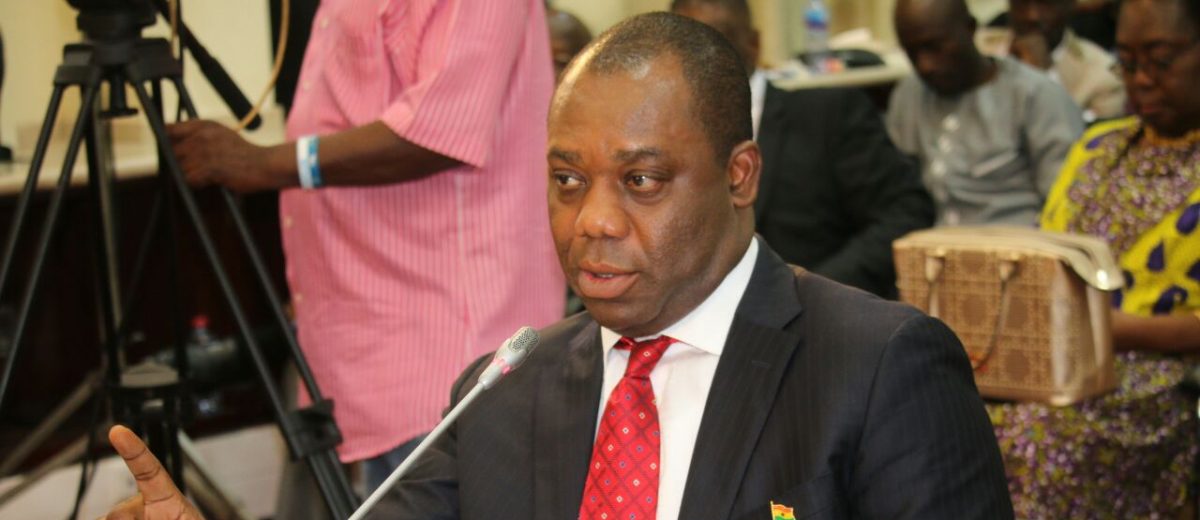
The University of Health and Allied Sciences (UHAS), Ho, has kicked against the Public Universities Bill with a grim warning that the Bill will deprive the Universities the needed freedom to blossom academically.
“Even though the current bill indicates ‘academic freedom’; it takes away from the Universities every facet of academic freedom. The definition of academic freedom provided in the Bill is too narrow as it focuses on the freedom of speech of lecturers. We are concerned that the bill suggests that the Minister of Education can issue policy directives to the University. This, in our view will be in conflict with the role of the University Council,” Dr C.S Kpeglo, Registrar of UHAS said in comments to the Minister of Education Mathew Opoku Prempeh on the Bill.
According to him, Universities worldwide including those in Ghana can determine for themselves what their contribution to societal development should be through consultative processes with key stakeholders including Government.
“It cannot be the responsibility of the Minister of Education to determine that, issuing directives to public universities. Our past and recent history suggest that this can be abused by some Ministers. In our opinion, University Councils should be empowered to do their work,” he stated.
Dr Kpeglo further noted the basic premise of a harmonised Public Universities Act is wrong as it seeks to make all public universities ‘look the same’ arguing the progress of universities worldwide is largely reflected in how different they can be from other universities or other institutions of higher education.
“Differentiation is generally seen as a major characteristic of university development. Societal progress is driven by academics and their institutions competing to generate new knowledge, and it is that competition which leads to differentiation and discovery. The Act setting up a university is expected to help define its character. As a consequence, universities cannot be treated with a “one size fits all” approach. This Public Universities Bill is designed to curb differentiation by taking away all incentives that promote competition and differentiation,” he stated.
In conclusion, “we do not think that under our present circumstances, having a unified Public Universities ACT will anyway inure to the benefit of public universities, especially the recently established ones which are struggling with inadequate infrastructure, staffing deficiencies, and equipment. In sum, the Bill takes away any incentive for Ghanaian public universities to seek to be innovative and progressive. It would eventually stifle initiative and politicise universities under the full control of the Minister of Education,” announced Dr Kpeglo
Below is UHAS’ full comments to the Education Minister
“PUBLIC UNIVERSITIES BILL, 2019 EXPLANATORY MEMORANDUM”
- The rationale for proposing a common ACT for all public universities is not clear. A much more appropriate approach will be to have a preamble to the document indicating the purpose, rationale or justification for warranting a merger of all public universities under one single ACT.
- Section 1 clause (3) under establishment of Public Universities says: “Where there is a hindrance to the acquisition of immovable property, the immovable property may be acquired for the Public University under the State Lands Acts, 1962 (Act 125) and the costs shall be borne by the University. “This is just not feasible. It is not clear how new universities will find the resources to pay for the land.
- Provisions for financing basic infrastructure for the universities by Government are completely missing from the document. It is our considered opinion that no public university should be established without a clearly identified stream of financing for the basic infrastructure required for operation.
- Our Unions are very dissatisfied with Section 3 which proposes a completely different composition of Council than what they have been used to over the last several decades of running universities in this country. Participation in governance is very key to consensus building and industrial harmony. From what we have gathered from our consultations, any attempt to exclude representatives of the various Unions on Council will lead to unnecessary unrest on our campuses.
- Whereas universities have followed the practice under the 1992 Constitution of electing their own Chancellors, the bill seeks to take away that right by making the appointment of a Chancellor the responsibility of the President. We are concerned that this bill proposes to take away this process of the University appointing its Chancellors which has worked beautifully over the last 27 years. It is our view that this may lead to politicisation of the universities, and will jeopardise the academic freedom and autonomy of universities, which will be a disservice to the nation.
- What is the rationale for reducing the tenure of the Vice Chancellor and Registrar to THREE years instead of the existing FOUR years? Effective university governance requires strategic planning and implementation which can hardly be achieved in three years. All over the developed world, they are given longer terms in office. On the African continent, it is usually between five and seven years.
- Section 23, clause 2 (a) suggests that a public university may enter into an agreement with another institution, whether academic or non-academic within or outside the Country in furtherance of the objectives for which it was established, ONLY with the approval by the Minister of Education, in consultation with the National Council for Tertiary Education. This clause effectively takes away every incentive that any serious academic will have for looking for partners to engage in research collaboration if ministerial approval is required. It also takes away a major function performed by a Vice Chancellor seeking to be innovative. In any case, the NCTE is hardly equipped to carry out the new roles assigned to it by the Bill.
- The role that is assigned the NCTE in the development of harmonized Statutes is extremely unhelpful. It means that Ghanaian public universities are not permitted to learn from international best practices and adapt their Statutes and practices. Properly constituted Visitation Panels can from time to time introduce best practises in the governance environment of Universities. Taking away the right to develop their own Statutes amounts to taking away the right to be innovative in governance. UHAS Council recently approved its own Statutes after THREE years of investment of time and financial resources. To think that this is potentially going to waste will be very unfortunate.
- Section 40 clause 4 requests the University Council to enact Statues for the regulation of intellectual property. There is usually ONE set of Statutes for the University. It is not clear why IP should have separate Statute.
- Even though the current bill indicates ‘academic freedom’; it takes away from the Universities every facet of academic freedom. The definition of academic freedom provided in the Bill is too narrow as it focuses on the freedom of speech of lecturers. We are concerned that the bill suggests that the Minister of Education can issue policy directives to the University. This in our view will be in conflict with the role of the University Council. Universities worldwide including those in Ghana can determine for themselves what their contribution to societal development should be through consultative processes with key stakeholders including Government. It cannot be the responsibility of the Minister of Education to determine that, issuing directives to public universities. Our past and recent history suggests that this can be abused by some Ministers. In our opinion, University Councils should be empowered to do their work.
- The basic premise of a harmonised Public Universities Act is wrong as it seeks to make all public universities ‘look the same’. The progress of universities worldwide is largely reflected in how different they can be from other universities or other institutions of higher education. Differentiation is generally seen as a major characteristic of university development. Societal progress is driven by academics and their institutions competing to generate new knowledge, and it is that competition which leads to differentiation and discovery. The Act setting up a university is expected to help define its character. As a consequence, universities
- Even though the current bill indicates ‘academic freedom’; it takes away from the Universities every facet of academic freedom. The definition of academic freedom provided in the Bill is too narrow as it focuses on the freedom of speech of lecturers. We are concerned that the bill suggests that the Minister of Education can issue policy directives to the University. This in our view will be in conflict with the role of the University Council. Universities worldwide including those in Ghana can determine for themselves what their contribution to societal development should be through consultative processes with key stakeholders including Government. It cannot be the responsibility of the Minister of Education to determine that, issuing directives to public universities. Our past and recent history suggests that this can be abused by some Ministers. In our opinion, University Councils should be empowered to do their work.
- The basic premise of a harmonised Public Universities Act is wrong as it seeks to make all public universities ‘look the same’. The progress of universities worldwide is largely reflected in how different they can be from other universities or other institutions of higher education. Differentiation is generally seen as a major characteristic of university development. Societal progress is driven by academics and their institutions competing to generate new knowledge, and it is that competition which leads to differentiation and discovery. The Act setting up a university is expected to help define its character. As a consequence, universities
- We note that on pages 31 and 35 of the document the name of our University is being repealed and will thus read ” Komla Agbeli Gbedemah University of Allied and Health Sciences, something, our Council rejected vehemently when the issue was raised some time last year. We do not see any merit in the change in name, but rather financial cost as we have to change all our letterheads, signages etc. If the recent furore of the change of name of Ho Technical University is anything to go by, we will respectfully ask Government to exercise caution in making such a move, especially when the University Council rejected the proposal overwhelmingly. We coincidentally note that the proposed change of name of University of Ghana to JB Danquah University of Ghana has been conveniently dropped from the bill following opposition from them.
- In conclusion, we do not think that under our present circumstances, having a unified Public Universities ACT will anyway inure to the benefit of public universities, especially the recently established ones which are struggling with inadequate infrastructure, staffing deficiencies, and equipment. In sum, the Bill takes away any incentive for Ghanaian public universities to seek to be innovative and progressive. It would eventually stifle initiative and politicise universities under the full control of the Minister of Education.
Source: Ghana/Starrfm.com.gh/103.5FM




